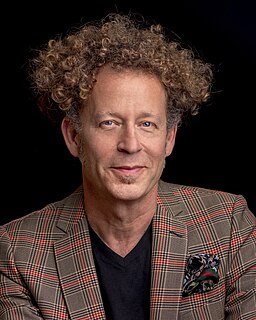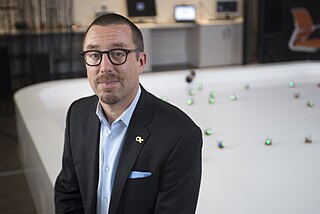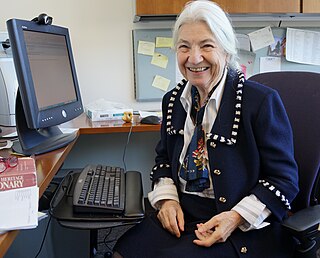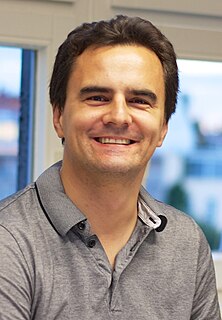
The School of Computer Science (SCS) at Carnegie Mellon University in Pittsburgh, Pennsylvania, US is a school for computer science established in 1988. It has been consistently ranked among the top computer science programs over the decades. As of 2022 U.S. News & World Report ranks the graduate program as tied for second with Stanford University and University of California, Berkeley. It is ranked second in the United States on Computer Science Open Rankings, which combines scores from multiple independent rankings.

Kenneth Yigael Goldberg is an American artist, writer, inventor, and researcher in the field of robotics and automation. He is professor and chair of the industrial engineering and operations research department at the University of California, Berkeley, and holds the William S. Floyd Jr. Distinguished Chair in Engineering at Berkeley, with joint appointments in Electrical Engineering and Computer Science (EECS), Art Practice, and the School of Information. Goldberg also holds an appointment in the Department of Radiation Oncology at the University of California, San Francisco.
Ekaterini Panagiotou Sycara is a Greek computer scientist. She is an Edward Fredkin Research Professor of Robotics in the Robotics Institute, School of Computer Science at Carnegie Mellon University internationally known for her research in artificial intelligence, particularly in the fields of negotiation, autonomous agents and multi-agent systems. She directs the Advanced Agent-Robotics Technology Lab at Robotics Institute, Carnegie Mellon University. She also serves as academic advisor for PhD students at both Robotics Institute and Tepper School of Business.

Magnus B. Egerstedt is a Swedish-American roboticist who is the Dean of the Henry Samueli School of Engineering at the University of California, Irvine. He was formerly the Steve C. Chaddick School Chair and Professor at the School of Electrical and Computer Engineering, Georgia Institute of Technology.
Vijay Kumar is an Indian roboticist and UPS foundation professor in the School of Engineering & Applied Science with secondary appointments in computer and information science and electrical and systems engineering at the University of Pennsylvania, and became the new Dean of Penn Engineering on 1 July 2015.
Henrik Iskov Christensen is a Danish roboticist and Professor of Computer Science at Dept. of Computer Science and Engineering, at the UC San Diego Jacobs School of Engineering. He is also the Director of the Contextual Robotics Institute at UC San Diego.

Ruzena Bajcsy is an American engineer and computer scientist who specializes in robotics. She is Professor of Electrical Engineering and Computer Science at the University of California, Berkeley, where she is also Director Emerita of CITRIS.
Maja Matarić is an American computer scientist, roboticist and AI researcher, and the Chan Soon-Shiong Distinguished Professor of Computer Science, Neuroscience, and Pediatrics at the University of Southern California. She is known for her work in human-robot interaction for socially assistive robotics, a new field she pioneered, which focuses on creating robots capable of providing personalized therapy and care that helps people help themselves, through social rather than physical interaction. Her work has focused on aiding special needs populations including the elderly, stroke patients, and children with autism, and has been deployed and evaluated in hospitals, therapy centers, schools, and homes. She is also known for her earlier work on robot learning from demonstration, swarm robotics, robot teams, and robot navigation.
Nancy Marie Amato is an American computer scientist noted for her research on the algorithmic foundations of motion planning, computational biology, computational geometry and parallel computing. Amato is the Abel Bliss Professor of Engineering and Head of the Department of Computer Science at the University of Illinois at Urbana-Champaign. Amato is noted for her leadership in broadening participation in computing, and is currently a member of the steering committee of CRA-WP, of which she has been a member of the board since 2000.

Saraju Mohanty is an American professor of the Department of Computer Science and Engineering, and the director of the Smart Electronic Systems Laboratory, at the University of North Texas in Denton, Texas. Mohanty received a Glorious India Award – Rich and Famous NRIs of America in 2017 for his contributions to the discipline. Mohanty is a researcher in the areas of "consumer electronics for smart cities", "application-Specific things for efficient edge computing", and "methodologies for digital and mixed-signal hardware". He has made significant research contributions to security and IP protection of consumer electronic systems, hardware-assisted security and protection, high-level synthesis of digital signal processing (DSP) hardware, and mixed-signal integrated circuit computer-aided design and electronic design automation. Mohanty has been the editor-in-chief (EiC) of the IEEE Consumer Electronics Magazine since 2016. He has held the Chair of the IEEE Computer Society's Technical Committee on Very Large Scale Integration since September 2014. He holds 4 US patents in the areas of his research, and has published 220 research articles and 3 books.

René Vidal is a Chilean electrical engineer and computer scientist who is known for his research in machine learning, computer vision, medical image computing, robotics, and control theory. He is the Herschel L. Seder Professor of the Johns Hopkins Department of Biomedical Engineering, and the founding director of the Mathematical Institute for Data Science (MINDS).
G. Ayorkor Korsah is the head of the Department of Computer Science at Ashesi University in Ghana.
Robin Roberson Murphy is an American computer scientist and roboticist. She is the Raytheon Professor of Computer Science and Engineering at Texas A&M University. She is known as a founder of the fields of rescue robotics and human-robot interaction and for inserting robots into disasters. Her case studies of how unmanned systems under perform in the field led cognitive engineer David Woods to pose the (Robin) Murphy's Law of Autonomy: a deployment of robotic systems will fall short of the target level of autonomy, creating or exacerbating a shortfall in mechanisms for coordination with human problem holders. Her TED talk “These Robots Come to the Rescue After a Disaster” was listed in TED Talks: The Official TED Guide to Public Speaking as one of the examples of a good TED talk. Murphy is also known for using science fiction as an innovative method of teaching artificial intelligence and robotics.

Jan Peters is a German computer scientist. He is Professor of Intelligent Autonomous Systems at Department of Computer Science of the Technische Universität Darmstadt.

Gregory D. Hager is the Mandell Bellmore Professor of Computer Science and founding director of the Johns Hopkins Malone Center for Engineering in Healthcare at Johns Hopkins University.
Mengchu Zhou is a Chinese Distinguished Professor of electrical and computer engineering in the Helen and John C. Hartmann Dept. of Electrical and Computer Engineering at New Jersey Institute of Technology (NJIT) and at Macau University of Science and Technology. He is the Chairman of IKAS Industries of Shenzhen in China and a Board Member of OneSmart Education Group headquartered in China.
Sonia Martínez Díaz is a Spanish mechanical engineer whose research applies control theory to the coordinated motion of robot swarms and mobile wireless sensor networks. She is a professor in the Department of Mechanical and Aerospace Engineering at the University of California, San Diego.
Debdeep Mukhopadhyay is an Indian cryptographer and professor at the Department of Computer Science and Engineering of the Indian Institute of Technology Kharagpur. He was awarded the Shanti Swarup Bhatnagar Award for Science and Technology, the highest science award in India, in 2021 for his contributions to micro-architectural security and cryptographic engineering. Debdeep Mukhopadhyay's research interests include Hardware security, Cryptographic Engineering, Design Automation of Cryptosystems, VLSI of Cryptosystems, and Cryptography. He has authored several textbooks, including Cryptography and network security, which has been cited 1227 times, according to Google Scholar. He was elevated to the Fellow of Indian National Academy of Engineers in 2021.







